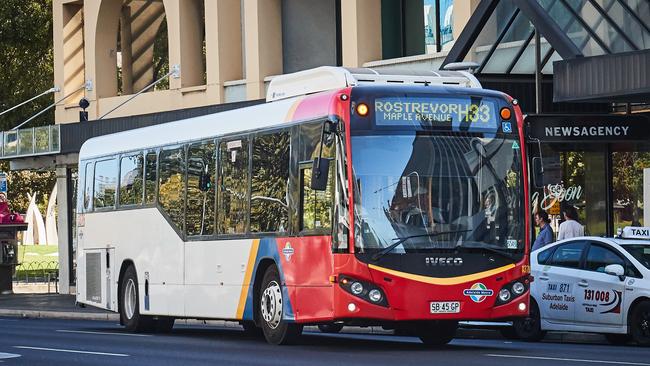Adelaide’s disability-accessible talking buses are getting their location wrong and mispronouncing street names
New talking buses are being trialled to help vision-impaired passengers navigate our city. Problem is, at times they don’t seem to know where they are – or how to pronounce Adelaide placenames.
Local
Don't miss out on the headlines from Local. Followed categories will be added to My News.
- Bus stops on major suburban roads get the chop
- Everything you get with your Advertiser digital subscription
“Talking” buses designed to help people with disabilities navigate around Adelaide are mispronouncing street names and announcing wrong locations.
The Transport Department is trialling a new audiovisual system on select routes to comply with federal discrimination laws.
It combines “next stop” announcements with prominent digital displays, automatically generated by a combination of GPS and the bus ticketing systems.
But during the extensive trials, some announcements have mistakenly placed buses on different streets to where they are actually travelling, for example confusing Wakefield St and Hutt St in the Adelaide CBD.
The computer-generated voiceover has also had troubles with pronouncing the names of some streets and landmarks along the routes used in the trials.
For example, the talking buses pronounce Duthy St in Unley, pronounced “Doothy” by locals, as “Dutthie”.
But even when the “next stop” system is failing to operate correctly, or a customer complains that it is annoying, bus drivers have no control to turn it off.

The department says it is looking to perfect the system before introducing it more widely.
“The voiceover is generated from GPS data from the ticketing system which also feeds the real-time information,” a spokesman said.
“Significant testing was undertaken prior to introduction and all location data was shown to be accurate.
“The department will take into consideration street name pronunciation and attempt to resolve this in the next system update.”
The department said the system was specifically designed to comply with the Disability Discrimination Act, under which it must provide both visual and audio displays.
“The audio assists people with vision impairments who are most in-need when it comes to being aware of where they are and what the next stop is,” the spokesman said.
According to department figures, Adelaide’s day-to-day bus fleet is now around 90 per cent disability accessible.
That does not include the back-up older buses used as rail substitutes during major rail and road upgrades.
In 2002, only about 30 per cent of the fleet was disability accessible.
The department said it would continue to work to ensure accessibility and inclusiveness, including through online and printed material.
